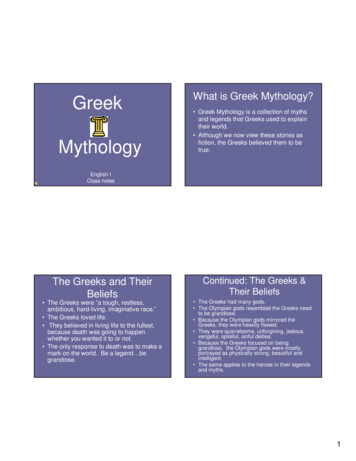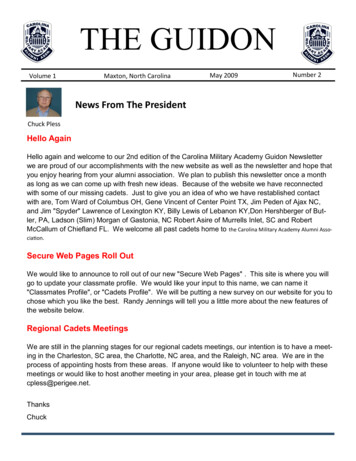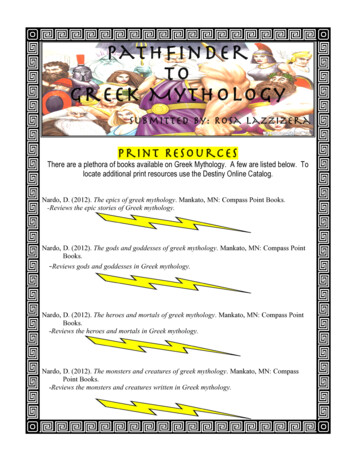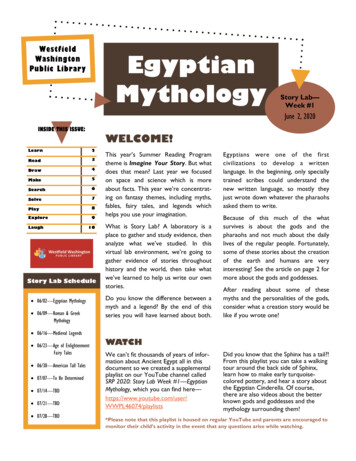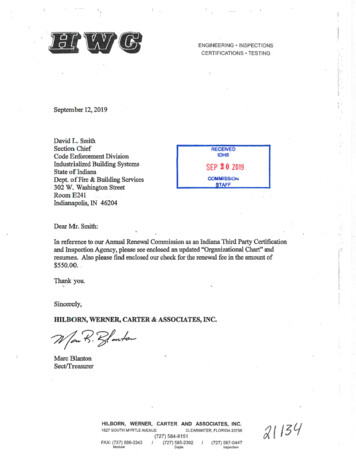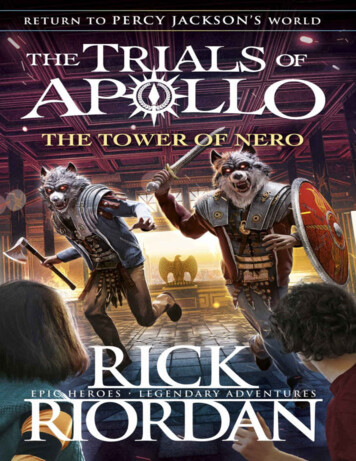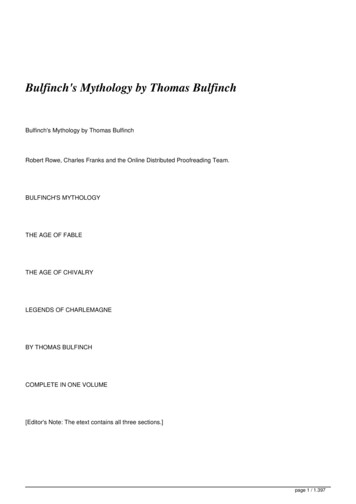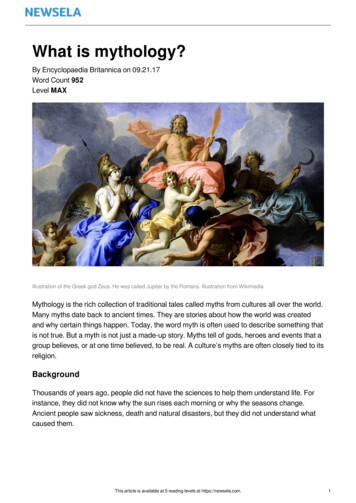
Transcription
What is mythology?By Encyclopaedia Britannica on 09.21.17Word Count 952Level MAXIllustration of the Greek god Zeus. He was called Jupiter by the Romans. Illustration from WikimediaMythology is the rich collection of traditional tales called myths from cultures all over the world.Many myths date back to ancient times. They are stories about how the world was createdand why certain things happen. Today, the word myth is often used to describe something thatis not true. But a myth is not just a made-up story. Myths tell of gods, heroes and events that agroup believes, or at one time believed, to be real. A culture’s myths are often closely tied to itsreligion.BackgroundThousands of years ago, people did not have the sciences to help them understand life. Forinstance, they did not know why the sun rises each morning or why the seasons change.Ancient people saw sickness, death and natural disasters, but they did not understand whatcaused them.This article is available at 5 reading levels at https://newsela.com.1
Groups of people developed their own stories and beliefs to explain the world around them.These stories were usually not written down. Instead, they were part of an oral tradition,meaning they were passed from one generation to another by telling them out loud as stories.Upon hearing the stories, people accepted them as the truth. In this way, myths becamebeliefs. It is for this reason that mythology is closely associated with religion.Types Of MythsSince each group of people developed their own explanations, mythology differs from cultureto culture. But all myths try to answer basic questions, such as: How was the world created?How did life on Earth begin? Why is there evil in the world?Myths explain the origins of Earth in many different ways. Many cultures believe that an allpowerful god created the world. For example, a myth of the Polynesian people tells that thegod Io formed the world out of water and darkness. People living in the cold lands of what isnow northern Europe believed that the mist was created first. According to the ancientScandinavian tradition, the mist flowed through 12 rivers and froze, filling the emptiness of theworld with many layers of ice, which was later melted by a warm wind. Other cultures,including the Arapaho of North America, as well as civilizations in Egypt and Japan, thought ofhumans as descendants of a sun god.To explain the origin of human beings, an ancient story from India described a being called theSelf. When the Self became lonely, it divided into two parts, creating man and woman. Theirchildren became the human race. Many myths from western Africa tell that the first beingswere a pair of twins. The Sumerians, an ancient Middle Eastern people, believed that the firstpeople came from clay. According to their myths, the water god told his mother to mold bits ofclay into the shapes of people.Many cultures also have myths explaining why there is evil in the world. For example, anancient Greek myth tells the story of Pandora, the first woman on Earth. She opened a jar andreleased all kinds of evil on the world. A great variety of other myths explain the origins ofanimals, plants and events in nature.Many other myths tell of the gods. Stories discuss their births, special powers and victoriesover monsters or enemies. Many cultures also have myths about heroes with amazingstrength or cleverness. For instance, ancient Greek myths tell that the brave warrior Heraclescompleted 12 nearly impossible tasks. The Chinese hero Yü is said to have saved China bydraining the land after a huge flood.This article is available at 5 reading levels at https://newsela.com.2
Collection Of MythsMany groups of people developed complex collections of myths, especially in ancient times.Their stories describe a group of gods and the world that the gods live in.The ancient Egyptians had many gods. Some looked like people and some looked likeanimals. The doglike god Anubis was the god of the dead. Re was the sun god. For a time, aruler named Amenhotep made the sun god the only god. He called the god Aton, and hechanged his own name to Akhenaton, or Ikhnaton. But after he died the other gods wereworshipped again.The ancient Greeks also worshipped many gods. They believed that a group of major godslived on Mount Olympus. The members of this group are often called the 12 Olympian gods.Some of the members changed over time. But Zeus was always the king of the gods.Although most myths were not recorded, the Greeks wrote about them in poems and dramas.The oldest of these writings are "The Iliad" and "The Odyssey," epic poems from the 700s or800s B.C. The poet Homer is said to have written these sources, which focus on eventssurrounding the Trojan War. They also tell of the activities of the gods. Myths about the Greekgods describe their births, their victories over monsters or rivals and their special powers. TheGreeks viewed their myths as divine or timeless truths. These truths influenced not onlyliterature, but the thoughts of Greek philosophers as well.This article is available at 5 reading levels at https://newsela.com.3
The ancient Romans borrowed much of the mythology of the Greeks. They gave many of theGreek gods new names. For example, Zeus became known as Jupiter. The great Roman poetOvid preserved these myths in his works. The stories became the source of poetry, drama,paintings and other works of art that are familiar to people in Europe and the Americas.Norse mythology developed long ago in northern Europe. Its main god was Odin. He and theother gods lived in Asgard. A palace called Valhalla was part of Asgard. After dying in battle,human warriors were taken to Valhalla by warrior women called Valkyries.This article is available at 5 reading levels at https://newsela.com.4
Quiz1Read the section "Types Of Myths." Select the paragraph from the article that suggests somegods were able to solve their problems by creating new beings.2Which sentence from the article supports the idea that it was not just gods but also human heroeswho were celebrated in famous myths?34(A)Many other myths tell of the gods.(B)Stories discuss their births, special powers and victories over monsters orenemies.(C)The Chinese hero Yü is said to have saved China by draining the land after ahuge flood.(D)He called the god Aton, and he changed his own name to Akhenaton, orIkhnaton.Which statement is a main idea of the article?(A)Many people used ancient myths to explain occurrences that had not beenexplained by science.(B)The famous ruler Amenhotep decided that the sun god would be the onlyimportant god.(C)Zeus was always king of the gods, despite many of the other gods havingimmense power as well.(D)The great Roman poet Ovid was able to preserve Roman myths in his works forfuture generations.Which sentence from the article would be most important to include in a summary of the article?(A)Northern Europeans fought bravely in battle in hopes that they would be takento Valhalla when they died.(B)Mythology proves important in understanding how many modern stories cameinto existence.(C)The ancient Greek hero Heracles was made famous by completing 12 verydifficult tasks.(D)In Sumerian culture, the water god was responsible for creating humans out ofbits of clay.This article is available at 5 reading levels at https://newsela.com.5
What is mythology? Illustration of the Greek god Zeus. He was called Jupiter by the Romans. Illustration from Wikimedia Mythology is the rich collection of traditional tales called myths from cultures all over the world. Many myths date back to ancient times. They are stories about how the world was created and why certain things happen.
